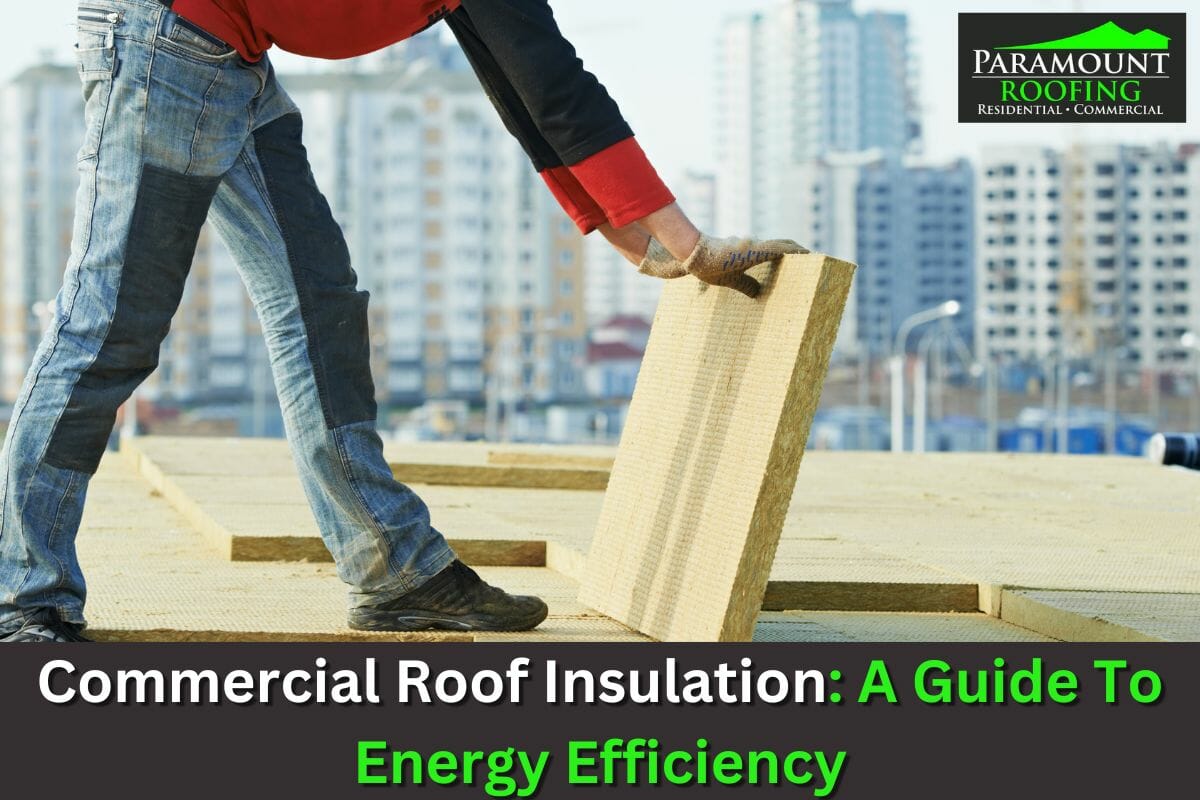Commercial buildings are infamous for their high levels of energy consumption, and one major culprit is the lack of proper insulation in their roofs. Whether you have an EPDM, TPO, built-up, or modified bitumen roof, having proper insulation is non-negotiable.
Your commercial roofing contractor can tell you all about roof insulation, but it’s always good to have some background knowledge before diving into a technical discussion with the experts.
In this blog post, you’ll learn everything about commercial roof insulation that property managers and owners should know. This information will help you effectively manage your building’s maintenance and energy consumption expenses.
Understanding Roof Insulation
Roof insulation is a material or layer installed in the upper roof of a building to reduce the transfer of heat and cold between the interior and exterior of the structure. It acts as a thermal barrier, which helps maintain the desired temperature and moisture levels inside the building, regardless of the weather outside.
👉 In summer, it helps prevent excessive heat from entering the building, reducing the need to use cooling systems and energy.
👉 In colder months, it acts as a barrier, preventing heat from escaping, which lowers the load on heating systems.
👉 Throughout the year, it facilitates proper roof and building ventilation by ensuring that air escapes and enters through the vents only.
But how is this beneficial for commercial buildings?
The Importance of Commercial Roof Insulation
Insulation is a necessary part of your commercial building, as it not only helps reduce energy costs but also creates a comfortable work environment.
👉 When your heating and cooling expenses are reduced, you’ll save on utility bills and can allocate those funds to other areas of your business.
👉 A well-insulated roof also provides a barrier against outside noise, such as traffic, machinery, hail, or rain, making the workplace more peaceful and productive.
👉 Insulation also contributes to maintaining a comfortable work environment, as it helps keep the temperature and humidity levels in check. A pleasant work environment enhances employee satisfaction and productivity, as employees can focus without being uncomfortable.
When you are getting a new roof or replacing old insulation, it’s essential to know about all your options. You need to select a suitable type for long-lasting, and optimal results. It’s best to invest in high-quality roof insulation that’s compatible with your roofing materials and business activities.
So, let’s explore the top insulation materials and methods available for commercial buildings with flat and low-sloped roofs.
Commercial Building Roof Insulation: Top 6 Materials
Here are the top insulation options for commercial buildings with flat or low-sloped roofs:
1. Polyisocyanurate (Polyiso) Insulation
Polyiso is a popular choice for commercial roofs due to its high R-value per inch, providing excellent thermal resistance. It’s lightweight, durable, and offers good moisture resistance, making it suitable for flat roofs.
2. Extruded Polystyrene (XPS) Insulation

XPS insulation is moisture-resistant and provides a consistent R-value. It has high compressive strength, making it ideal for flat roofs with foot traffic or heavy loads.
3. Expanded Polystyrene (EPS) Insulation
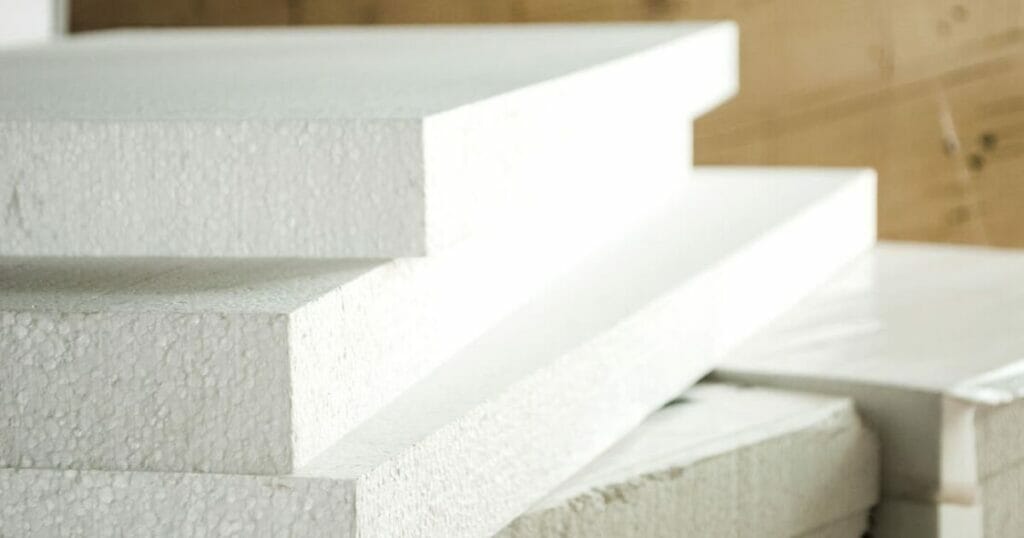
EPS is lightweight, cost-effective, and offers good thermal performance. It’s commonly used for flat and low-sloped roofs and can be easily shaped to fit various roof configurations.
4. Mineral Wool Insulation
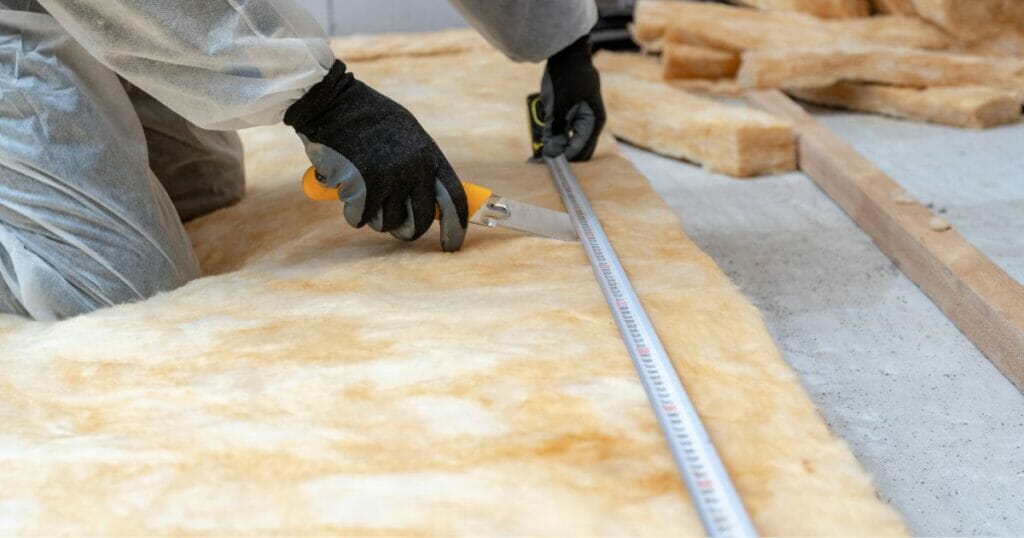
Mineral wool insulation, made from volcanic rock or slag, is fire-resistant and offers good thermal and acoustic insulation properties. It’s suitable for both flat and low-sloped roofs.
5. Spray Polyurethane Foam (SPF)
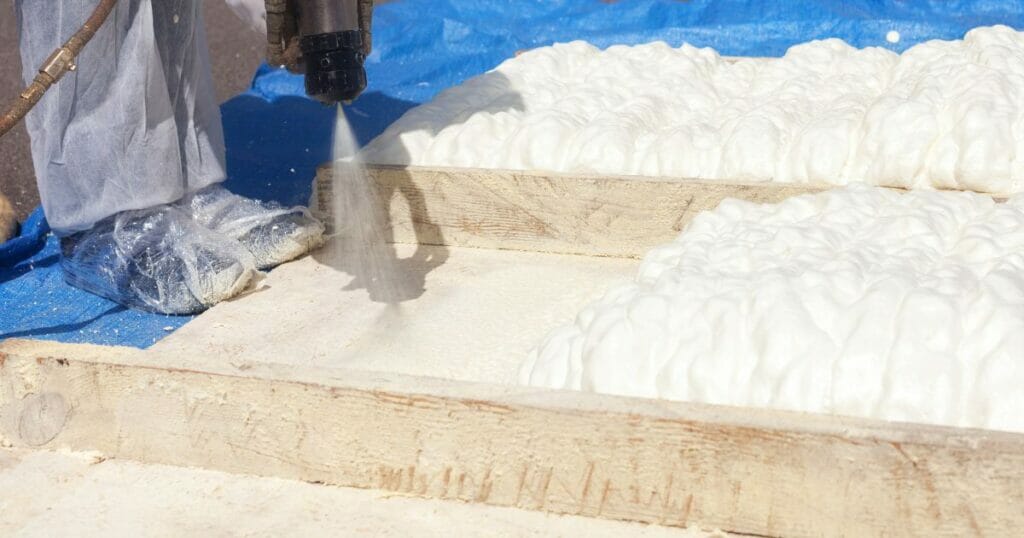
SPF is a versatile insulation option that provides an airtight seal and high insulation value. It conforms to irregular surfaces, making it suitable for flat roofs. It also acts as a seamless air and moisture barrier.
6. Tapered Insulation
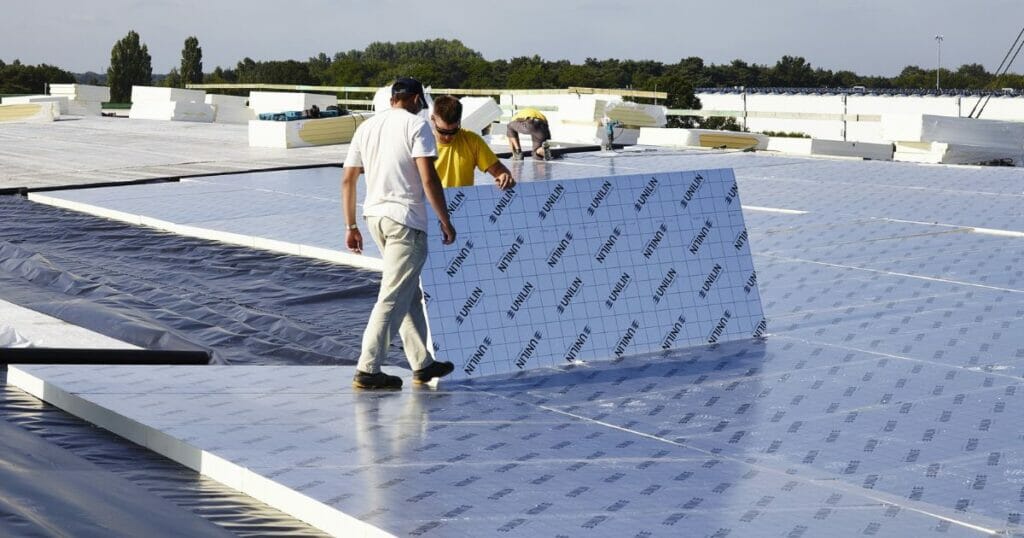
Tapered insulation is designed to provide proper roof drainage on flat roofs. It’s often used in combination with other types of insulation to create a slope for efficient water runoff.
There are different ways to install these materials, and it’s important to choose the best method for your type of roof.
Top 5 Ways To Install Commercial Flat Roof Insulation
Installation techniques and quality play a major role when it comes to roofing, insulation, and similar work. Here are the best ways to install insulation materials on commercial flat roofs:
1. Mechanically Attached
In this method, the insulation boards are mechanically fastened to the roof deck using screws or plates. The roofing membrane is then attached to the insulation.
2. Adhered
Insulation boards are adhered to the roof deck using a compatible adhesive. The roofing membrane is then placed directly over the insulation.
3. Ballasted
Insulation boards are placed on the roof deck, and the roofing membrane is then placed over the insulation. A ballast layer, such as gravel or pavers, is added on top to hold the insulation in place.
4. Hybrid Systems
Hybrid systems combine different insulation methods to achieve the desired thermal performance and other functional requirements for the commercial roof.
5. Inverted Roof Membrane Assembly (IRMA)
IRMA involves placing the insulation on top of the roof membrane, protecting it from temperature fluctuations and providing additional thermal resistance.
The insulation material and installation method are chosen based on the type of roof, local climate, building design, budget, and energy efficiency goals.
Choosing the Right Roof Insulation for Your Commercial Building
There are several factors to consider when you choose a roof insulation for a commercial building:
#1 R-Value
One crucial factor is the R-value of the insulation. This measures the insulation’s ability to resist heat transfer, with a higher R-value indicating better insulation. It’s essential to choose an insulation with a high enough R-value to meet the energy codes and requirements for your area.
#2 Roof Type
Another factor to consider is the type of roof your building has. Different roofing materials and systems require specific insulation materials and methods. For example, if you have a flat roof, you may need insulation that can be applied in multiple layers to provide adequate coverage. On the other hand, if you have a sloped roof, you may need insulation that can be installed between tight spaces.
#3 Durability and Moisture Resistance
Next, consider the durability and moisture resistance of the insulation. Flat and low-sloped roofs are often affected by harsh weather, so it’s important to choose insulation that can withstand these conditions without degrading or becoming damaged. Moisture resistance is also important to prevent mold and mildew growth, which can affect the air quality and overall comfort of the building.
#4 Space and Load-Bearing Capacity of the Roof
Evaluate the available space within the roof structure and its load-bearing capacity. Some insulation methods, like adding multiple layers of insulation, may require additional load-bearing capacity, which could influence your choice of insulation.
Think about these factors and discuss them with your roofing contractor. Take their advice, and don’t rush your final decision.
Additionally, go through these expert tips below to choose the right insulation contractors for your project.
Commercial Roof Insulation: Installation and Maintenance Tips
The first step is to make sure you hire the right team for the job.
1. Select a Reliable Commercial Roofing Contractor
👉 Look for contractors with the necessary licenses, certifications, and insurance. This ensures they meet industry standards and guidelines.
👉 Research the contractor and look for reviews and testimonials from previous customers to understand the quality of their work and track record of customer satisfaction.
👉 Seek recommendations from trusted sources within your professional network, such as architects, contractors, or fellow business owners.
👉 Ask for a portfolio showcasing insulation projects they’ve completed. This provides insight into their expertise and the range of projects they handle.
2. Communicate Your Requirements Clearly
📢 Clearly articulate your goals for energy efficiency, desired R-values, and budget constraints to the professionals. Effective communication ensures that both parties are on the same page.
📢 Engage in discussions about the best materials to use for your commercial roof insulation based on your requirements and usage.
3. Supervise and Ensure Proper Installation Techniques
🔎 Ensure there’s adequate supervision during the installation process. Regular checks and quality control measures will guarantee that the installation meets industry standards.
🔎Insist that the installation follows the manufacturer’s guidelines for the chosen insulation material. Deviating from these guidelines may compromise the effectiveness of the insulation.
🔎 Make sure all gaps and joints are properly sealed to prevent air leakage, ensuring maximum insulation performance.
4. Regular Maintenance and Inspections
⚙️ Establish a maintenance schedule to conduct regular inspections of the insulation system. Check for any signs of damage, displacement, or moisture accumulation.
⚙️ If issues are identified during inspections, address them promptly to prevent further damage and maintain the insulation’s effectiveness.
⚙️ Evaluate how the insulation is affecting your building’s energy consumption and environmental impact. Adjustments may be needed to optimize energy efficiency.
5. Consider Energy Audits
Conduct energy audits to assess the overall efficiency of your commercial building. This will help identify areas for improvement and determine if adjustments or upgrades to the insulation are necessary. Act on the recommendations provided by the energy audit to enhance your insulation system’s performance and reduce energy consumption.
6. Stay Informed and Updated
Keep yourself informed about the latest advancements in low-slope and flat roof insulation technology, materials, and installation techniques. This knowledge will aid you in making informed decisions regarding your commercial roof insulation.
A well-installed and adequately maintained insulation system is an investment that yields long-term benefits in terms of energy savings, sustainability, and indoor comfort.
If you are looking to insulate your commercial roof in Metro Detroit, our team at Paramount Roofing is happy to be your roofing partner.
Discuss Your Roof Insulation Needs with the Experts in Metro Detroit
At Paramount Roofing, our roof insulation experts will inspect your roof and provide you with a comprehensive report. We will work with you to develop a project plan for uninterrupted workflow and timely completion of the project. Plus, we’re always ready to provide ongoing support and maintenance services to make sure your roof will last for years to come. So, call us at (586) 571-9007 and schedule a free consultation with our experts about your commercial roof insulation in Metro Detroit. We’ll be happy to tell you why numerous business owners in Detroit trust us with the safety and performance of their building’s roof.
 Free Estimate
Free Estimate

